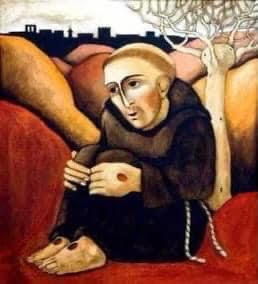No Sentimental Saint
- MUMC
- Oct 5, 2023
- 3 min read
By Rev. John Wright, a retired UMC minister
Originally written as a Facebook post in October 2021, shared with permission
Everybody loves St. Francis. Just the mention of his name conjures up sentimental images of the goodly saint preaching to the birds of the air and the animals of the forest, not to mention his fabulous encounter with the wolf of Gubbio.
Now don’t get me wrong. I can be as sentimental as any sentimental silly you can imagine. I took great joy in introducing the “Blessing of the Animals” to the congregations I served. I applaud that Francis has become an unofficial patron saint of the ecology movement. But, in retrospect, I wonder: When we wrap St. Francis in thick layers of sentiment, are we perhaps trying to protect ourselves from the challenge he poses to our comfortable lifestyle?
So, if I could paint a modern icon of St. Francis to hang above my work desk, it would not be like the sentimental one attached below. No, it would be some modern version of Giotto’s scene depicting the young Francis’s defiant confrontation with his father. The handsome son of a rich cloth merchant, Francis wasted his youth in prodigal carousing and dissipation. Then, having grown satiated from “la dolce vita” as he led the town youth in nightly drinking contests that bawled and brawled their way through the streets of Assisi, this party animal set out to prove his manhood on the battlefield.
But then, at the age of 25, Francis experienced a life-altering conversion. While praying in the dilapidated road-side chapel of Saint Damian’s, he heard the icon of Christ telling him, “Go, repair my house.” Taking these words literally, he ran to his father’s warehouse, stole a bolt a very expensive cloth, sold it in the next town, and brought the proceeds to the chapel’s priest. When the priest refused to accept the money, Francis threw the coins on the floor. Enraged upon the discovery of his son’s theft, his father had him arrested and hauled before the local bishop to demand Francis’s repentance and reparation. As the angry father was accusing his ungrateful son, (who, after all, had his father to thank for all he had), Francis suddenly stripped off his clothes and stood naked before the townspeople and the bishop, who tried to cover him with his robe. Then he handed his clothes to his father with these words: “Until now I have called Pietro Bernardone my father. But now I am giving him back his money, which he is so concerned about, as well as all the clothes that he has paid for. And from now on, I only wish to say, ‘Our Father, who art in heaven.’” And with that, he walked away from father and family into a life of poverty.
A thousand years before Francis, another rebel had declared, “Go, sell everything you have. Give the money to the poor. . .then come, follow me.” (Mark 10:21) This rebel also issued the totally off-putting, alienating criterion for discipleship: “If anyone comes after me and does not hate father and mother, wife and children, brothers and sister –yes, even their own life—such a person cannot be my follower.” (Luke 14:26) Most of us, including myself, spend our lives trying to “explain away” these words. There are even seminary courses and Bible commentaries to tell you how to do that. Nevertheless, once every millennium or so, there comes a fool who takes the Fool at his word –seriously, literally. And then actually lives his words! In so doing, this countercultural saint exposes the materialism which our age so takes for granted. Francis yanks from us the alleged impossibility of Jesus’s words with which, like a cloak, we have tried to cover and hide ourselves, in order to confront us with the question “Why not?” as a real possibility for our lives.
No wonder such a man experienced the stigmata. He truly “denied himself and took up his own cross . . .sharing in Christ’s sufferings and becoming like him in his death” (Mark 34; Phil. 3:10). In a sentence, Francis lived Jesus's words, leaving me with no excuse for why I cannot.










Comments